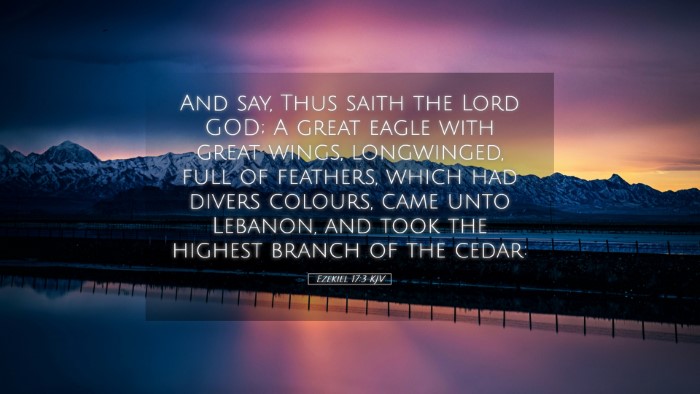Ezekiel 17:3 - A Commentary
Bible Verse Context: Ezekiel 17:3 states, “Say to them: 'This is what the Sovereign Lord says: A great eagle with powerful wings, long feathers, and a full plumage of varied colors came to Lebanon. Taking hold of the top of a cedar,'” (NIV). This metaphor sets the stage for a deeper understanding of Israel's political situation.
General Overview
This verse is part of a parable used by the prophet Ezekiel to reveal profound truths about the fate of Jerusalem and its leaders. This parable highlights themes of sovereignty, divine intervention, and the nature of trust in alliances.
Commentary Insights
Insights from Matthew Henry
Matthew Henry emphasizes the allegorical nature of Ezekiel's writings. In his commentary, he notes that the “great eagle” serves as a symbol of powerful kingdoms—most notably Nebuchadnezzar's Babylonian Empire. Henry depicts the eagle as a figure that not only represents strength but also the swift execution of divine judgment against Israel.
- Symbolism of the Eagle: Henry explains that the eagle's power reflects the might of those who oppress God's people.
- Divine Sovereignty: He underscores that God allows this eagle to exert its power over Israel as a form of divine discipline.
- Folly of Trust: Henry warns that trusting in political alliances, akin to appealing to the “great eagle” instead of God, leads to dire consequences.
Insights from Albert Barnes
Albert Barnes provides a thorough exegetical approach to this verse. He articulates that the eagle symbolizes the king of Babylon, elaborating on the historical context in which this prophecy was delivered.
- Historical Context: Barnes contextualizes the imagery within the period of the Babylonian siege of Jerusalem, indicating that this was a direct warning to the exiles about the futility of their alliances.
- Significance of the Cedar: He further explains that the cedar represents Israel itself, indicating the strength and beauty of God's chosen people, who are now vulnerable.
- God's Judgment: Barnes emphasizes that through this metaphor, God intended to convey that His plans and purposes would ultimately prevail despite human opposition.
Insights from Adam Clarke
Adam Clarke approaches this text with a pastoral lens, reflecting on the implications of the image of the eagle as a ruler. He highlights the psychological impact of such powerful imagery on the audience.
- Psychological Implications: Clarke discusses the fear and awe such images would inspire in the hearts of the people, illustrating God's might through the metaphor of the eagle.
- Spiritual Abandonment: He laments the spiritual state of Israel, indicating that their reliance on earthly powers reflects a deeper abandonment of their covenant relationship with God.
- Call to Repentance: Clarke urges the readers to recognize the need for repentance and returning to God, who alone can offer true protection and guidance.
Concluding Thoughts
Collectively, the insights from these esteemed commentators offer a profound understanding of Ezekiel 17:3. As pastors, theologians, and scholars, it is critical to recognize the layered meanings within this verse:
- The Nature of God's Sovereignty: The dominate theme is God's ultimate authority over nations and rulers, showcasing that He uses them for His purposes.
- The Danger of Alliances: A major takeaway is the admonition against relying on earthly powers rather than placing faith in God's providence.
- The Call Toward Spiritual Integrity: The prophetic word serves as a reminder for God’s people to remain faithful and to trust in Him during tumultuous times.
In conclusion, Ezekiel 17:3 serves not only as a historical reflection but also as an enduring reminder for contemporary believers of the importance of maintaining faith during distress and discerning the nature of divine authority as it operates within the world.


